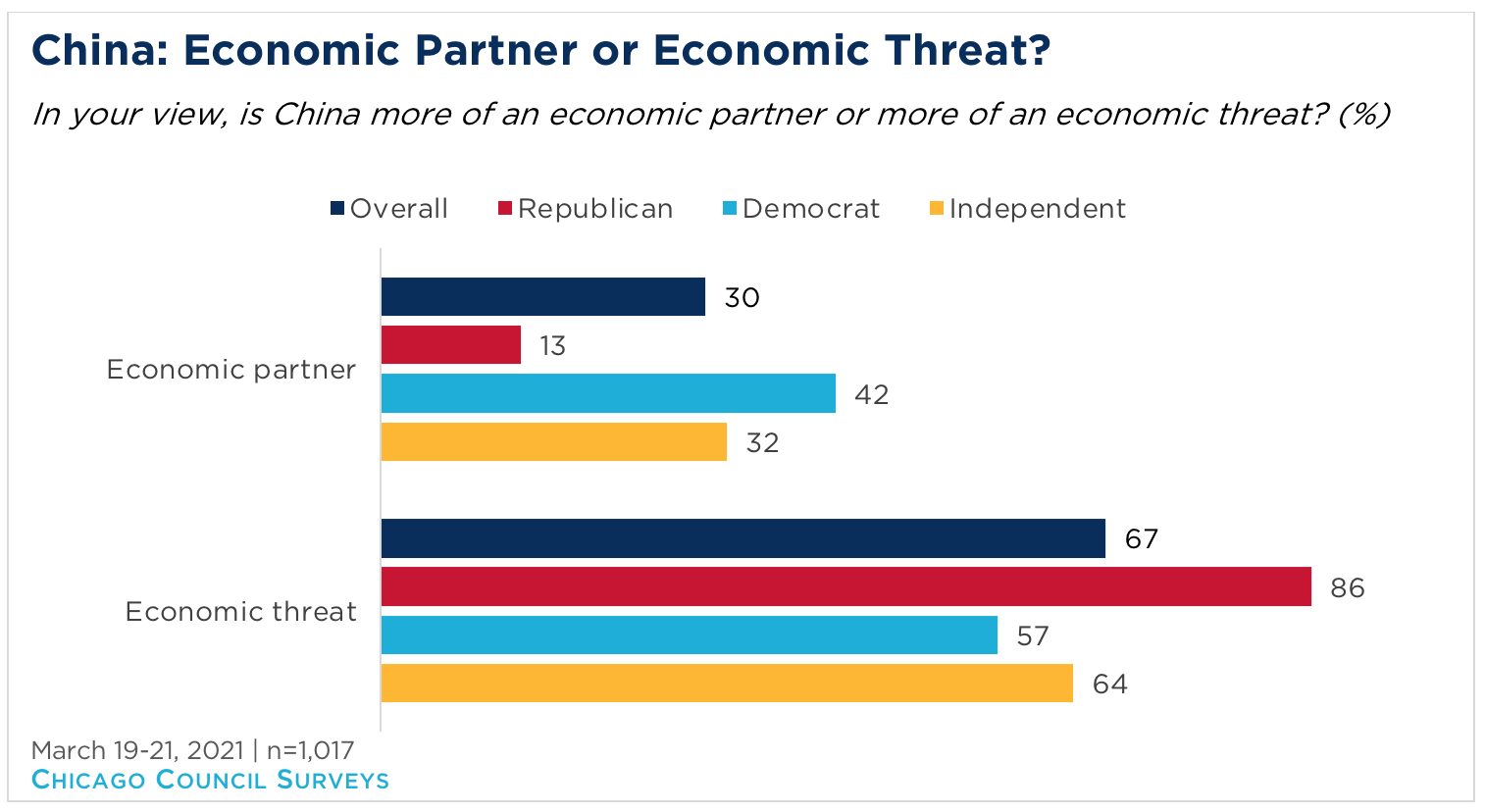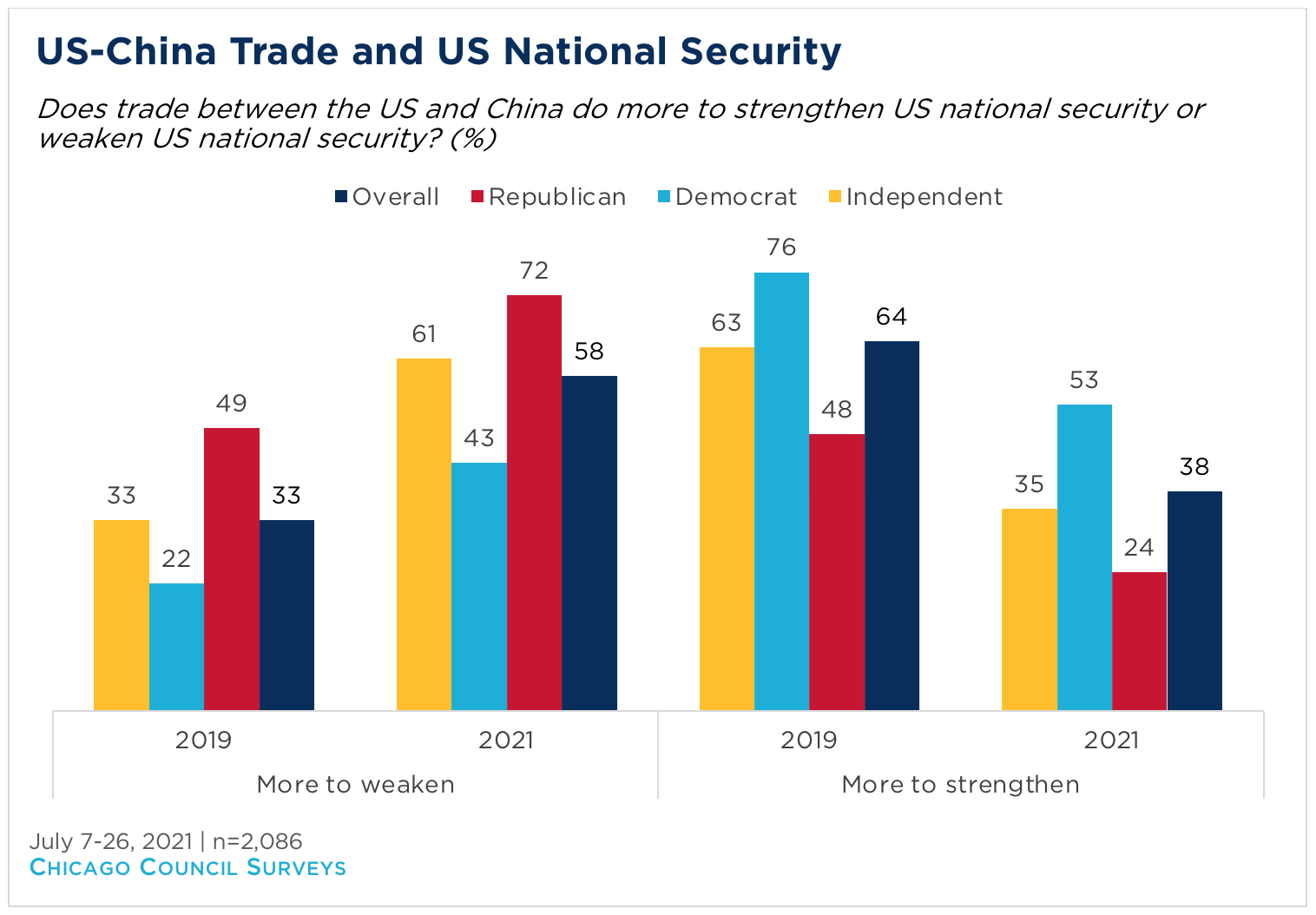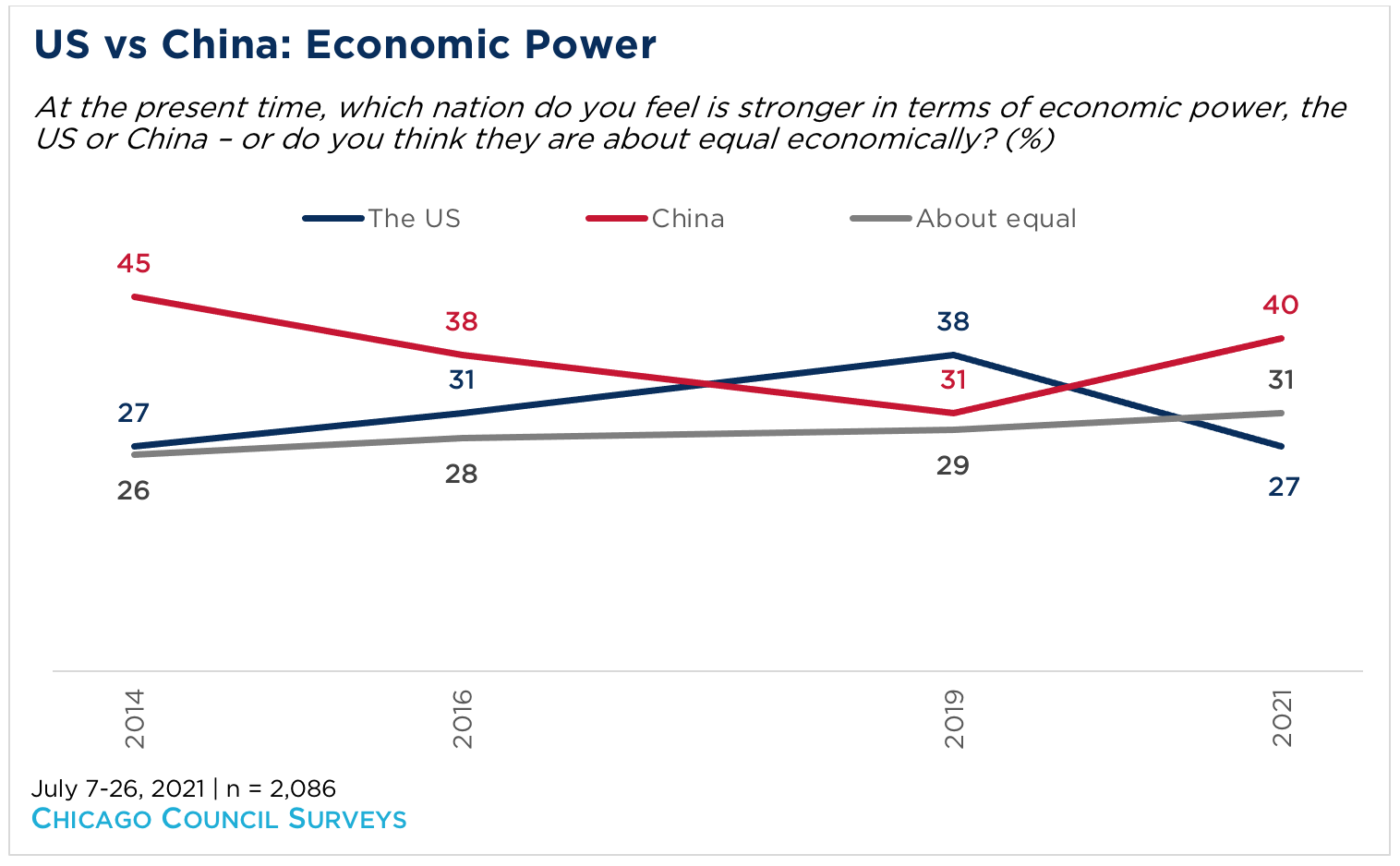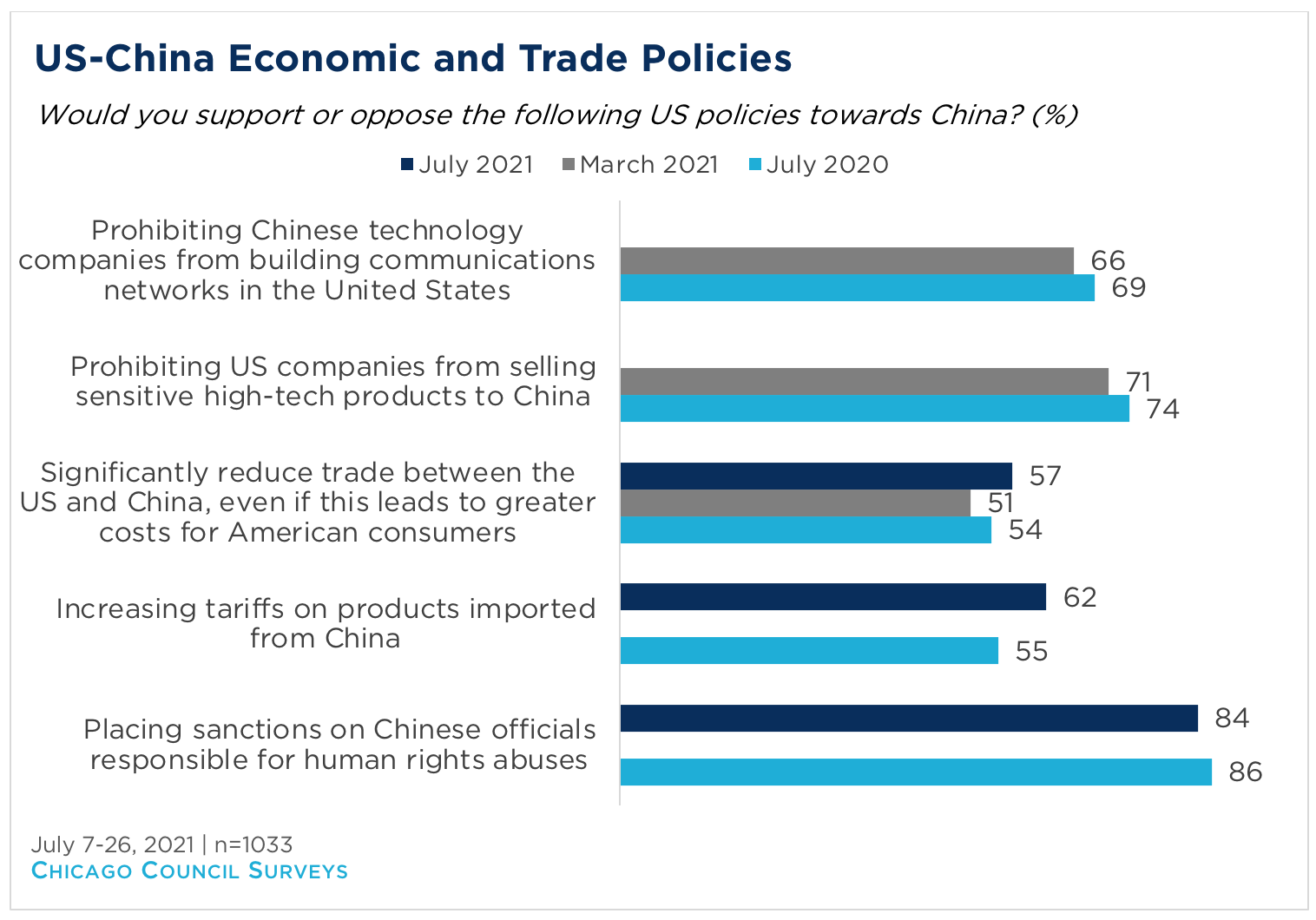Americans and US-China Trade Relations

The American public is increasingly skeptical of the US-China trade relationship, and narrow majorities support increased restrictions on both trade and technological exchanges.
On October 4, US Trade Representative Ambassador Katherine Tai delivered a major address on the US-China trade relationship, laying out the Biden administration’s approach to an economic relationship “of profound consequence.” Ambassador Tai argued that Chinese policies “have reinforced a zero-sum dynamic,” in which “China’s growth and prosperity come at the expense of workers and economic opportunity here in the US.”
The American public is also concerned about the US-China trade relationship. In a sharp change from 2019, Americans believe that trade between the United States and China weakens US national security. A majority see China as an economic threat rather than an economic partner. And a plurality now see China as a stronger economic power than the United States. In response, majorities of Americans support restrictions on US-China trade and technology exchanges.
Key Findings
- A plurality of Americans (40%) say China is the stronger economic power (27% say US, 31% about equal), a change from 2019 when more saw the US as the stronger power.
- Two-thirds of Americans see China as more of an economic threat (67%) than an economic partner (30%).
- A majority of Americans now say that trade between the United States and China does more to weaken US national security (58%, up from 38% in 2019).
- Americans support increased tariffs on Chinese products (62%) and significant reductions in trade between the two nations even if it leads to greater costs to American consumers (57%).
Americans See China as an Economic Threat, Not a Partner
In the 2021 Chicago Council Survey, conducted July 7-26, most Americans describe China as either a rival (32%) or as an adversary (29%), with only two in 10 (21%) describing it as a necessary partner (and very few—2%—naming it as an ally). This view of the US and China extends into views of US-China economic relations. In a March 2021 Chicago Council poll, a majority of Americans described China as an economic threat (67%), rather than an economic partner (30%). Republicans are notably more likely to view China as an economic threat (86%), while Democrats are more divided, with six in 10 (57%) seeing China as an economic threat and four in 10 (42%) seeing it as an economic partner.

Americans Now Say US-China Trade Weakens US National Security
It is not simply that Americans see China negatively, or see China as an economic threat. In a dramatic shift from 2019, a majority of Americans now say that trade between the US and China does more to weaken US national security (58%, up from 38% in 2019). By contrast, two years ago—in the midst of the US-China trade war—two-thirds of Americans believed that US-China trade strengthened US national security (64%, now down to 38%).

Today, most Republicans (72%) see US-China trade as weakening US national security, as do six in 10 Independents (61%). Democrats are more divided: 53 percent say trade with China strengthens US national security, while 43 percent say it weakens US security. Despite the differences between partisan groups, all partisans have seen a similar shift in attitudes: over the past two years, Republicans (+23 percentage points), Democrats (+21), and Independents (+28) have all become more likely to say that US-China trade weakens US national security.
Declining Confidence in US Economic Power Compared to China
Americans are also less confident in US economic power today than they were in 2019. The 2021 Chicago Council Survey finds that a plurality of Americans (40%) say that China is stronger than the United States economically, up from 31 percent who said the same in 2019. Another three in 10 (31%) see the United States and China as about equal economically, and a quarter (27%) see the United States as stronger.

This shift in attitudes since 2019 has occurred across partisan lines, though not to the same extent among each group. Today, three in 10 Republicans (31%, down from 44%), 30 percent of Democrats (down from 36%), and a quarter of Independents (23%, down from 37%) see the United States as economically stronger than China. But while pluralities of Republicans (41%) and Independents (43%) see China as the stronger economic power, Democrats are divided between seeing China as stronger (35%) and seeing the United States and China as about equal (34%).
Support for Restricting US-China Trade and Tech
The public’s concern about declining US economic power relative to China is helping drive support for policies aimed at targeting and reversing that decline. There’s also a slowly growing level of support for restrictions on trade between the United States and China. A majority of Americans (62%, up from 55% in 2020) favor increasing tariffs on products imported from China. Many (57%, up from 54% in 2020) favor significant reductions in trade between the two countries, even if this leads to greater costs.
Technology has also been an area of concern for the Biden administration. As the 2021 Interim National Security Strategy states, the United States must “confront unfair and illegal trade practices, cyber theft, and coercive economic practices that hurt American workers, undercut our advanced and emerging technologies, and seek to erode our strategic advantage and national competitiveness.” Americans too are concerned about the technological angle of US-China relations, and many support limits on the technological exchange between the United States and China. Half of Americans (52%) favor restricting the exchange of scientific research between the United States and China, and March 2021 Council polling found that majorities of Americans favored prohibiting US companies from selling sensitive high-tech products to China (71%) and prohibiting Chinese technology companies from building communications networks in the United States (69%).

Methodologies
This analysis is based on data from the 2021 Chicago Council Survey of the American public on foreign policy, a project of the Lester Crown Center on US Foreign Policy. The 2021 Chicago Council Survey was conducted July 7–26, 2021, by Ipsos using its large-scale nationwide online research panel, KnowledgePanel, among a weighted national sample of 2,086 adults, 18 or older, living in all 50 US states and the District of Columbia. The margin of sampling error for the full sample is +/- 2.33 percentage points, including a design effect of 1.1817. The margin of error is higher for partisan subgroups or for partial-sample items.
Partisan identification is based on respondents’ answer to a standard partisan self-identification question: “Generally speaking, do you think of yourself as a Republican, a Democrat, an Independent, or what?”
The 2021 Chicago Council Survey is made possible by the generous support of the Crown family and the Korea Foundation.
Additional results come from the Council’s 2021 Trilateral Survey, part of a larger project focusing on US-Japan-South Korea cooperation. This survey was conducted by Ipsos from March 19 to 21, 2021, using its large-scale online research panel, KnowledgePanel, among a weighted national sample of 1,019 adults 18 or older living in all 50 US states and the District of Columbia. The margin of sampling error for the full sample is +/- 3 percentage points. This survey was made possible by the generous support of the Carnegie Corporation of New York, the Korea Foundation, and the Nakasone Peace Institute.

